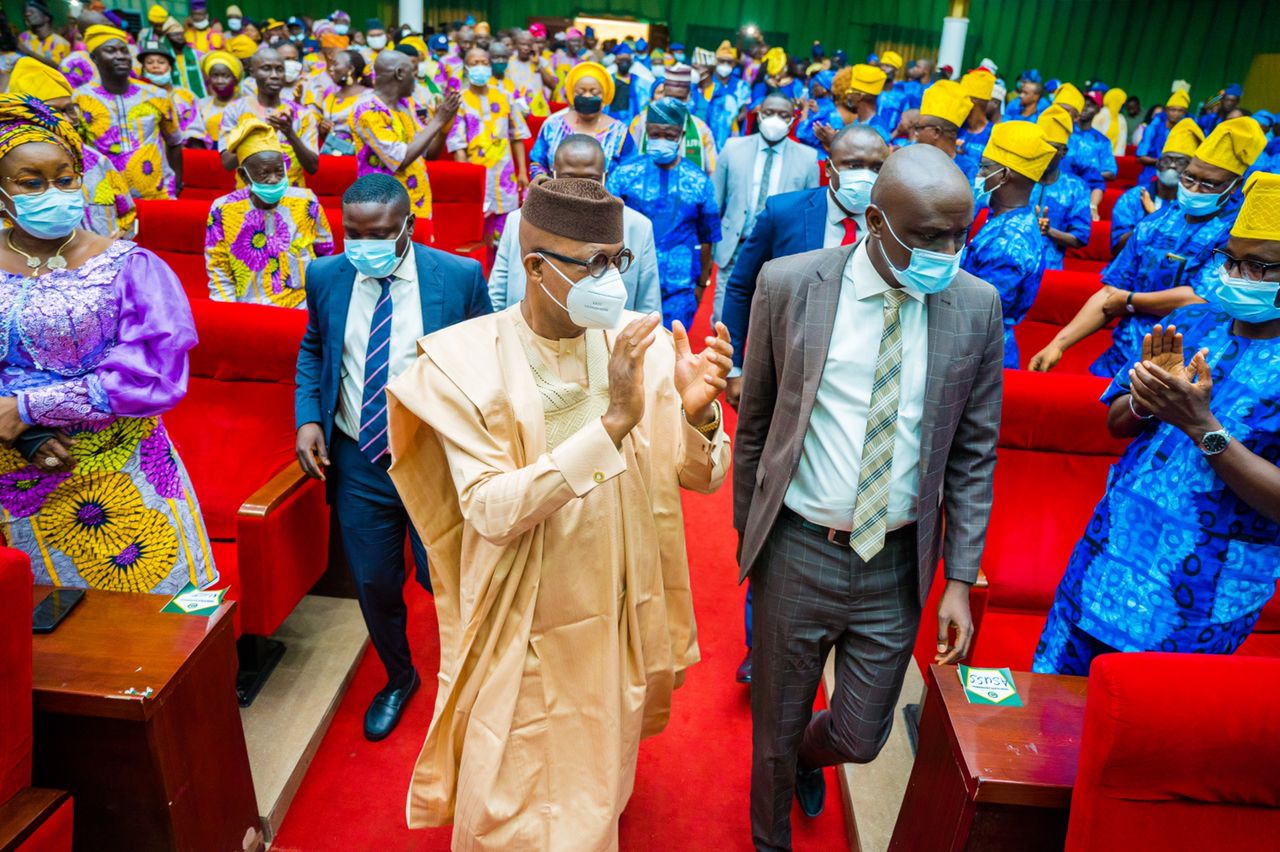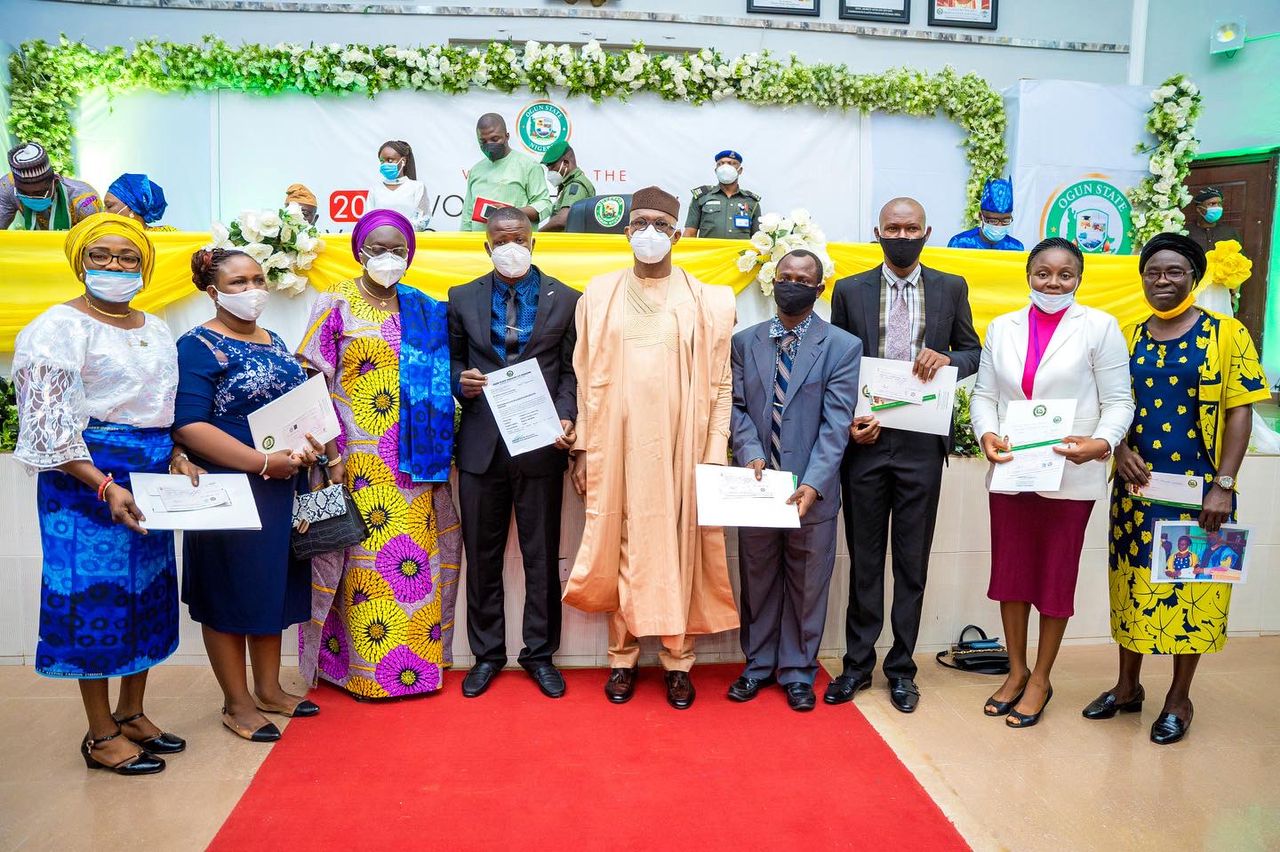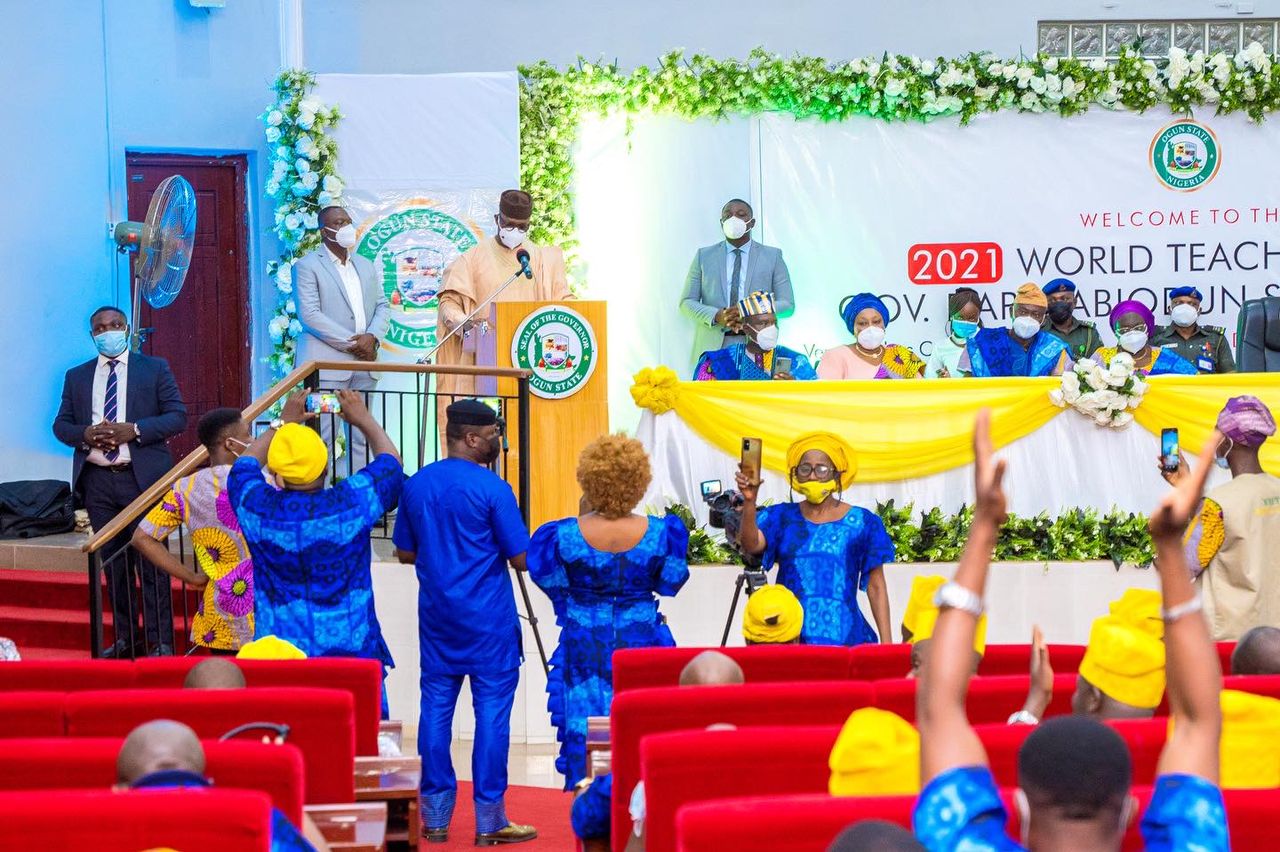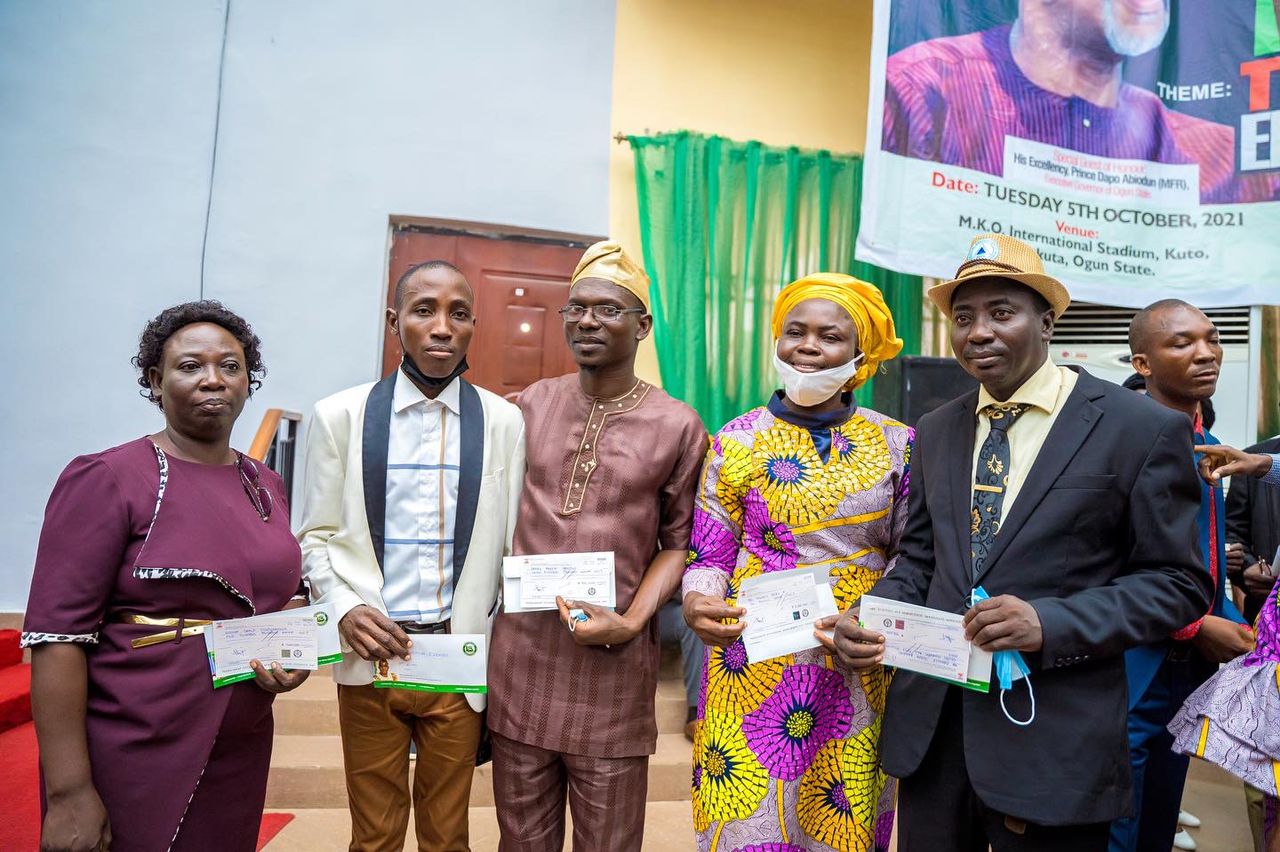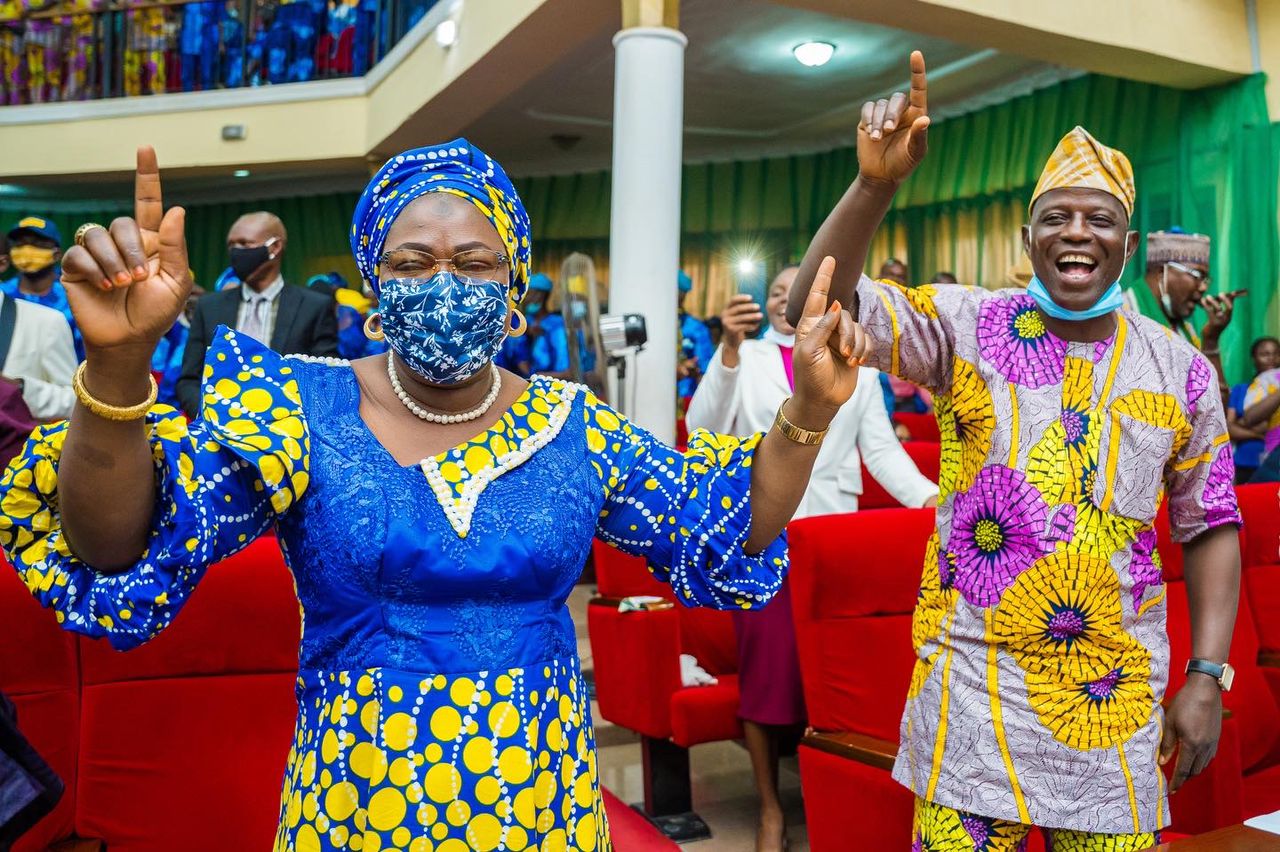society
World Teachers Day: Abiodun rewards teachers with cash, house in Ogun
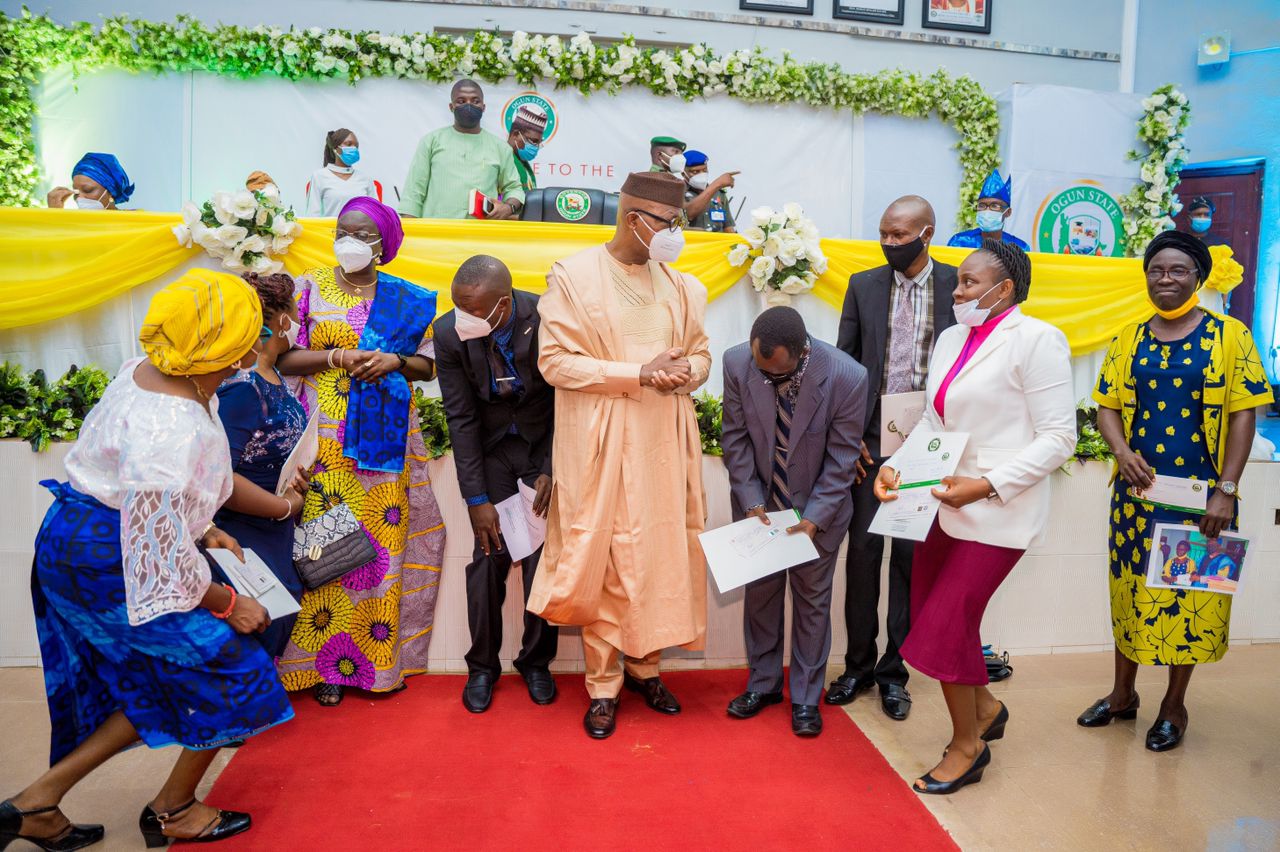
World Teachers Day: Abiodun rewards teachers with cash, house in Ogun
…orders immediate release of appointment letters to 5000 new teachers
…allocates secretariats land to ANCOPSS, AOPSHON
Ogun State Governor, Dapo Abiodun has rewarded best teachers in the state with cash prizes ranging from 1million Naira to 2million Naira.
The governor equally gifted a semi-detached bungalow to the best overall teacher for year 2020 in the state.
He, however, disclosed that he had approved the immediate release of engagement letters to successful candidates of the Ogun Teach Programme to relieve the workload of teachers in the state, just as he also noted that he has approved the establishment of the Ogun State Education Intervention Fund (OGSEIF) to achieve improved funding for the educational sector of the state
Abiodun, who also announced the allocation of lands to the All Nigeria Conference of Principals of Secondary Schools (ANCOPSS) and Association of Primary School for their secretariats, Headteachers of Nigeria (AOPSHON) for the construction of their secretariats in the state, disclosed this at the event organised to celebrate the 2021 World Teachers Day, held at the Obas Complex, Abeokuta.
He said his administration will continue to recognise and reward excellence in the teaching profession,
He described teachers as “holders of lamp” who illuminate the society and commended teachers under the umbrella of the Nigeria Union of Teachers (NUT) and the Academic Staff Union of Secondary School (ASUSS) for their role in shaping the future leaders.
“The benefit of education to a society is akin to what lamp does to a person groping in the dark. The holder of the lamp in this case is the teacher. And in the words of a Greek Philosopher, Plato (428 – 347 B.C.) No society develops beyond the capacity of its teachers”. The governor noted.
He said role of teachers in the provision of an efficient and effective educational system that not only prepares the products for the opportunities and challenges of the present day, but also equips them for a brighter future, can never be overemphasized.
Abiodun added that whatever educational system the state puts in place, it will go down to the teachers who actually interpret and manifest the vision at the classroom level, saying “therefore, the result of our educational system is simply a demonstration of the efficiency and effectiveness of our teachers”
The governor said the theme for the 2021 World Teachers’ Day, ‘Teachers at the Heart of Education Recovery’ is very apt and instructive, reiterating that his administration would continue to prioritise welfare of teachers.
“As we are all aware, one of the great challenges that confronts the society is to restore the status of the teacher to his traditional place as role model and worthy mentor for our children. It is our duty as government and people to focus on the future of the profession and prepare the young dedicated teachers for the 21st-century’s challenges of preparing our children for the challenges and opportunities in the knowledge society and make them globally competitive.
“We must continue to attract bright-minded young teachers to the teaching profession so that we will not miss the young creative minds in order to their becoming great educators.
“Today, it is our joy that the teaching profession has been given a lift in our dear state. Our teachers are professionals; and our administration has never hesitated to treat them as such. We have resuscitated holding of workshops, seminars and other training programmes for teaching and non-teaching staff of the state public schools, to enhance their efficiency and productivity. We have witnessed a significant feedback of the success of our approaches and programmes in the development of our Education Sector through the recent exploits of our young academic laureates. Ogun State contingent won 11 laurels for our dear State in different categories of awards in the areas of Science, Technology, Engineering and Mathematics (STEM). Ogun State Institute of Technology (OGITECH) also won for our dear State the best compliant Institution in Nigeria to the tune of N75 Million from Joint Admissios and Matriculation Board (JAMB).
“I must also mention that I was bestowed with awards as the best Education friendly Governor by All Nigeria Conference of Principals of Secondary Schools (ANCOPSS) in the South-West and Best Governor in Educational Sector by the National Parents Teachers Association. All these give me an assurance that our Administration must be doing something right, even as I acknowledge that we are yet to attain our desired position, but it is gratifying that we are making steady progress. This achievement is a further confirmation of the status of our dear State not only as Education capital of Nigeria, but, in fact, as the intellectual melting-pot in Nigeria. Education remains one of the biggest industries in Ogun State. Indeed, one of the proud legacies bequeathed to us by the founding fathers of our dear State. The best we can do is to ensure that we sustain this proud legacy. But in all this, the role of teachers remains critical.
“We will continue to do all that we can to ensure that our teachers have the ambience to perform their divine role towards the development of our dear State in particular, and humanity, in general. For over two years and four months now, the Education Sub-sector of the State has received serious attention by our Administration. Our approach is multi-dimensional to include infrastructural development; human capital development; provision of conducive environment, amongst others”. Abiodun pointed out.
Reeling out achievements of his administration in the past 28 months in the education sector, the governor said, “immediately we came on board, 28 months ago, we ordered the release of promotion letters to deserving primary and secondary school teachers due for promotion in 2016 and 2017; the process of supplying new furniture to all primary and secondary schools for the use of our learners to cushion the effects of acute shortage of furniture in our Schools is on-going; rehabilitation of over 956 classrooms in our primary and secondary Schools; we are upgrading 42 of our Secondary Schools to Flagship Schools for better performance and productivity; I have given approval for the commencement of Ogun Digitalized Multimedia Lesson Plan where the teachers would be equipped with the wherewithal resources for effective delivery.
“Working in collaboration with a non-profit organisation; we have integrated 100 Fellows into Teach for Nigeria Programme; we have successfully introduced the Pre-Shaded Optical Mark Recognition (OMR) objective answer sheet for the conduct of Basic Education Certificate Examination (BECE); a 50% increase in feeding allowance for learners in Special Needs Schools; full sponsorship of public school students to all academic competitions; resuscitation and relocation of Ogun State Braille Book Production Centre which has been moribund for many years; annual distribution of wheel chairs to the Special Needs Learners; commencement of the renovation of all the five Special Needs Schools in the State including provision of modern toilet facilities; approval of scholarships for outstanding students in all our tertiary institutions; approval for the establishment of Ogun State Education Intervention Fund (OGSEIF) to achieve improved funding; reinstatement / Appointment of Headmaster/ Principal General.
“We have done all these and many more in the firm belief that teachers are the true pillars of a successful Nation. These and many other actions of our Administration show, in practical terms, our commitment to education. I therefore enjoin our teachers to continue to be committed, innovative and painstaking in the discharge of their duties”.
society
Ramadan: Adron Homes Felicitates Muslims, Preaches Hope and Unity

Ramadan: Adron Homes Felicitates Muslims, Preaches Hope and Unity
Adron Homes & Properties Limited has congratulated Muslim faithful on the commencement of the holy month of Ramadan, urging Nigerians to embrace the virtues of sacrifice, discipline, and compassion that define the season.
In a statement made available to journalists, the company described Ramadan as a period of deep reflection, spiritual renewal, and strengthened devotion to faith and humanity.
According to the management, the holy month represents values that align with the organisation’s commitment to integrity, resilience, and community development.
“Ramadan is a time that teaches patience, generosity, and selflessness. As our Muslim customers and partners begin the fast, we pray that their sacrifices are accepted and that the season brings peace, joy, and renewed hope to their homes and the nation at large,” the statement read.
The firm reaffirmed its dedication to providing affordable and accessible housing solutions to Nigerians, noting that building homes goes beyond structures to creating environments where families can thrive.
Adron Homes further urged citizens to use the period to pray for national unity, economic stability, and sustainable growth.
It wished all Muslim faithful a spiritually fulfilling Ramadan.
Ramadan Mubarak.
society
Underfunding National Security: Envelope Budgeting Fails Nigeria’s Defence By George Omagbemi Sylvester

Underfunding National Security: Envelope Budgeting Fails Nigeria’s Defence
By George Omagbemi Sylvester | Published by saharaweeklyng.com
“Fiscal Rigidity in a Time of Crisis: Lawmakers Say Fixed Budget Ceilings Are Crippling Nigeria’s Fight Against Insurgency, Banditry, and Organized Crime.”
Nigeria’s legislature has issued a stark warning: the envelope budgeting system; a fiscal model that caps spending for ministries, departments, and agencies (MDAs) is inadequate to meet the country’s escalating security challenges. Lawmakers and budget analysts argue that rigid fiscal ceilings are undermining the nation’s ability to confront insurgency, banditry, kidnapping, separatist violence, oil theft and maritime insecurity.
The warning emerged during the 2026 budget defence session for the Office of the National Security Adviser (ONSA) at the National Assembly in Abuja. Senator Yahaya Abdullahi (APC‑Kebbi North), chairman of the Senate Committee on National Security and Intelligence, decried the envelope system, noting that security agencies “have been subject to the vagaries of the envelope system rather than to genuine needs and requirements.” The committee highlighted non-release or partial release of capital funds from previous budgets, which has hindered procurement, intelligence and operational capacity.
Nigeria faces a multi‑front security crisis: persistent insurgency in the North‑East, banditry and kidnappings across the North‑West and North‑Central, separatist tensions in the South‑East, and piracy affecting Niger Delta oil production. Despite declarations of a national security emergency by President Bola Tinubu, lawmakers point to a “disconnect” between rhetoric and the actual fiscal support for agencies tasked with enforcement.
Experts warn that security operations demand flexibility and rapid resource allocation. Dr. Amina Bello, a public finance specialist, said: “A static budget in a dynamic threat environment is like sending firefighters with water jugs to a forest fire. You need flexibility, not fixed ceilings, to adapt to unforeseen developments.”
The Permanent Secretary of Special Services at ONSA, Mohammed Sanusi, detailed operational consequences: irregular overhead releases, unfulfilled capital appropriations, and constrained foreign service funds. These fiscal constraints have weakened intelligence and covert units, hampering surveillance, cyber‑security, counter‑terrorism and intelligence sharing.
Delayed capital releases have stalled critical projects, including infrastructure upgrades and surveillance systems. Professor Kolawole Adeyemi, a governance expert, emphasized that “budgeting for security must allow for rapid reallocation in response to threats that move faster than political cycles. Envelope budgeting lacks this essential flexibility.”
While the National Assembly advocates fiscal discipline, lawmakers stress that security funding requires strategic responsiveness. Speaker Abbas Ibrahim underscored that security deserves “prominent and sustained attention” in the 2026 budget, balancing oversight with operational needs.
In response, the Senate committee plans to pursue reforms, including collaboration with the executive to restructure funding, explore supplementary budgets and ensure predictable and sufficient resources for security agencies. Experts warn that without reform, criminal networks will exploit these gaps, eroding public trust.
As one policy analyst summarized: “A nation declares a security emergency; but if its budget does not follow with real resources and oversight, the emergency remains rhetorical.” Nigeria’s debate over envelope budgeting is more than an accounting dispute; it is a contest over the nation’s security priorities and its commitment to safeguarding citizens.
society
Rev. Mother Kehinde Osoba (Eritosin) Celebrates as She Marks Her Birthday

Rev. Mother Kehinde Osoba (Eritosin) Celebrates as She Marks Her Birthday
Today, the world and the body of Christ rise in celebration of a rare vessel of honour, Rev. Mother Kehinde Osoba, fondly known as Eritosin, as she marks her birthday.
Born a special child with a divine mark of grace, Rev. Mother Eritosin’s journey in God’s vineyard spans several decades of steadfast service, spiritual depth, and undeniable impact. Those who know her closely describe her as a prophetess with a heart of gold — a woman whose calling is not worn as a title, but lived daily through compassion, discipline, humility, and unwavering faith.
From her early days in ministry, she has touched lives across communities, offering spiritual guidance, prophetic insight, and motherly counsel. Many testify that through her prayers and teachings, they encountered God in a deeply personal and transformative way. Near and far, her influence continues to echo — not only within church walls, but in homes, families, and destinies reshaped through her mentorship.
A mother in every sense of the word, Rev. Mother Kehinde Osoba embodies nurture and correction in equal measure. As a grandmother, she remains energetic in purpose — accommodating the wayward, embracing the rejected, and holding firmly to the belief that no soul is beyond redemption. Her life’s mission has remained consistent: to lead many to Christ and guide them into the light of a new beginning.
Deeply rooted within the C&S Unification, she stands tall as a spiritual pillar in the Cherubim and Seraphim Church globally. Her dedication to holiness, unity, and prophetic service has earned her widespread respect as a spiritual matriarch whose voice carries both authority and humility.
As she celebrates another year today, tributes continue to pour in from spiritual sons and daughters, church leaders, and admirers who see in her a living reflection of grace in action.
Prayer for Rev. Mother Kehinde Osoba (Eritosin)
May the Almighty God, who called you from birth and anointed you for His service, continually strengthen you with divine health and renewed vigour.
May your oil never run dry, and may your prophetic mantle grow heavier with greater glory.
May the lives you have nurtured rise to call you blessed.
May your latter years be greater than the former, filled with peace, honour, and the visible rewards of your labour in God’s vineyard.
May heaven continually back your prayers, and may your light shine brighter across nations.
Happy Birthday to a true Mother in Israel — Rev. Mother Kehinde Osoba (Eritosin).
More years.
More anointing.
More impact.
If you want this adapted for a newspaper page, church bulletin, Facebook post, or birthday flyer, just tell me the format and tone.
-

 celebrity radar - gossips6 months ago
celebrity radar - gossips6 months agoWhy Babangida’s Hilltop Home Became Nigeria’s Political “Mecca”
-

 society6 months ago
society6 months agoPower is a Loan, Not a Possession: The Sacred Duty of Planting People
-

 society5 months ago
society5 months agoReligion: Africa’s Oldest Weapon of Enslavement and the Forgotten Truth
-

 news6 months ago
news6 months agoTHE APPOINTMENT OF WASIU AYINDE BY THE FEDERAL GOVERNMENT AS AN AMBASSADOR SOUNDS EMBARRASSING

